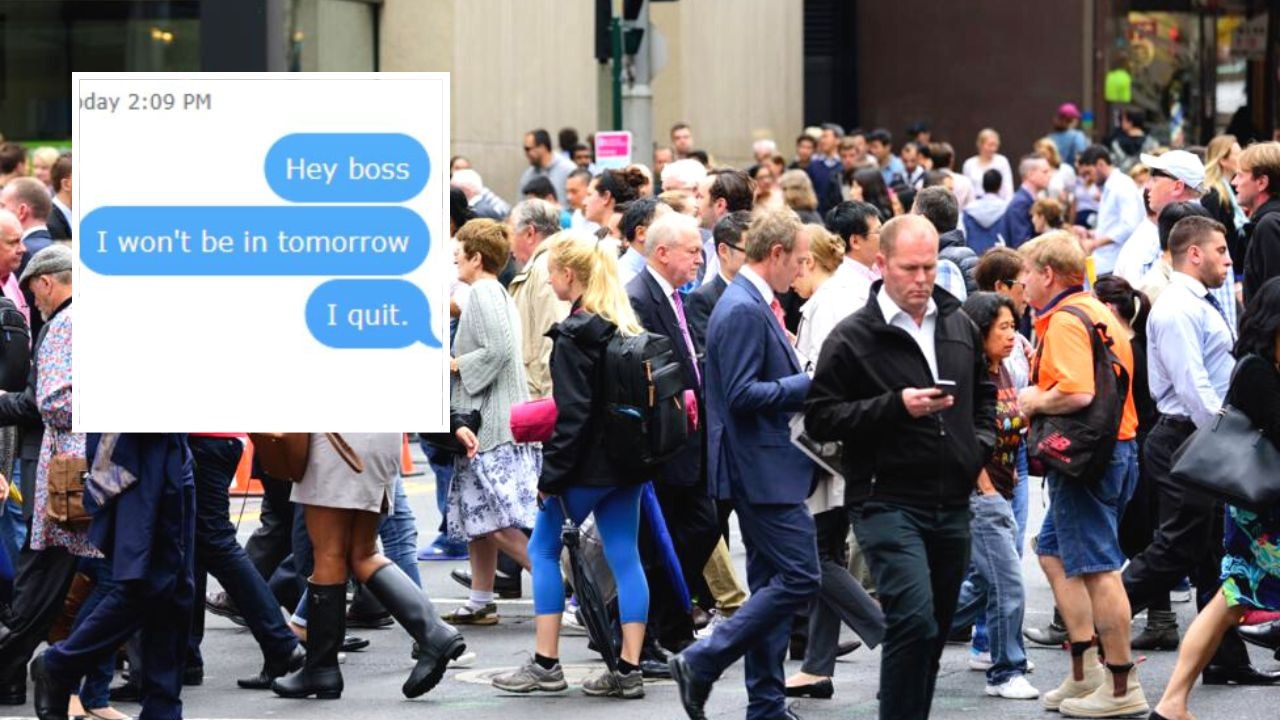Young Aussies aren’t just quiet quitting anymore, they are straight up quitting
Forget quiet quitting, young Aussies are spearheading a new workplace trend – and it’s one that employers really won’t be happy about.

“What happens if you don’t just stick it out?”
It’s a question these Aussies found out when they quit their new jobs within the first six months of starting them.
It sounds simplified, but Australia’s culture has always been about people having a go, so what happens if you have one… and you still just want to go home.
It’s becoming more and more normal to bail on a job that isn’t working sooner rather than later.
Sure, we’ve heard of quiet quitting, lazy girl jobs and even acting your wage, but just old fashioned quitting is also a thing.

It doesn’t hurt that, according to Australian Bureau of Statistics, the unemployment rate has remained steady at 3.7 per cent for August.
A Finder survey also found that 14 per cent of Aussies had moved jobs between May and August in 2022.
Young people are feeling more empowered to quit and the odds are in their favour.
Ben Thompson, CEO and founder at Employment Hero, said he can see that quitting quickly has become a wider trend.
“Gone are the days when employees would stay in unfulfilling roles indefinitely, with almost 1 in 10 workers changing employers in the past year,” he told news.com.au.
Instead, Mr Thompson has noticed that employees are always “re-evaluating” their priorities and work isn’t always the focus.
“Today’s workforce is not afraid to make swift moves if a job doesn’t align with their career prospects and values or detracts from their wellbeing,” he explained.

For *Amy, she landed a pretty cool gig in marketing for a niche Aussie brand that she was passionate about.
The kind that people would say, “Wow, you work there? Do you get any freebies?”
She lasted less than six months.
Amy explained it was a bunch of things that made her leave.
It was the fact that her boss would “shhhh” her in meetings like she was a small child. It was the creepy factor of her boss creating a little spreadsheet where she would log all of Amy’s comings in and goings.
Finally, it was when she got exiled to the company’s warehouse for two weeks – this made zero sense because she didn’t work in warehousing – and was then “berated” for not knowing what to do.
So what finally made her bite the bullet?
“She pulled me into a performance review to chew me out, and ultimately my performance wasn’t great because she made me so nervous. I was sobbing in a glass meeting room the entire time and the whole office could see in,” she told news.com.au.
Initially, Amy took the criticism on the chin. It was a new job and she could still settle in. Maybe she was doing the wrong thing. But then she went for a walk and the time in the fresh air offered her clarity.
“I came back, kicked the meeting room door open, interrupted her new meeting, and said, ‘I’m not okay with anything that just happened, so I’m done.”

*Josh found himself in a similar situation
He snagged a job in a government call centre and was the only one in his intake offered a full-time gig.
At the beginning he found this incredibly “flattering” and was keen to get stuck into his new job.
He quit after just two days.
On his second day he was left alone on the floor because everyone was in a training day. He had no idea what he was doing yet and couldn’t handle the influx of calls and demanding customers.
“I was running between floors asking other team leaders for help and begging case managers to take the call instead,” he said.
The whole day was a mess and Josh officially couldn’t cope.
“End of the shift, I was so anxious that I had a panic attack. I thought it was chest pains and I went to the hospital, but because of my family’s cardiac history, they kept me overnight. The next day, I quit,” he said.
Gary Hunter, insurance expert at Finder, said that leaving a job isn’t a bad thing but warned there’s lots of “vulnerability” involved in securing new work.
“A lot of vulnerability is involved in seeking and starting new employment. As households grapple with rising costs, many would rather stick it out, even if unhappy, than run the risk of being out of work.”
Hunter said having a backup plan handy before quitting your job is ideal and something you should consider even with a low unemployment rate.
“Whether it’s getting your resume sorted or your finances in order, having a game plan in place will help you while you’re on the hunt for a new job, or settling into a job.”






